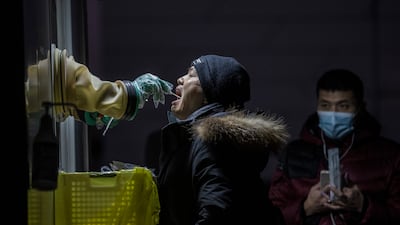Travellers will be required to take a Covid-19 test within 72 hours of arriving in Beijing, state media announced after the Chinese capital reported its first Omicron case as it prepares to stage the Winter Olympics next month.
On Saturday, the city reported the first local infection of the highly transmissible Omicron variant, involving a person who had visited several malls and restaurants in the previous 14 days. The person had not left the city since the start of this year.
The new rule, effective from January 22 to the end of March, aims to aid the early detection of Omicron, which is surging globally, and the control of pandemic risks, Beijing Daily, a government newspaper, said.
The capital city already requires inbound travellers to take a Covid-19 test within 48 hours of departure for the city and have a green code on the city's health tracking app.
The city and neighbouring Hebei province will host the Olympics, which start on February 4, inside a “closed loop” separating athletes and other Games personnel from the general public.
In Tianjin, a neighbouring city with close economic ties with the capital that is battling a Covid-19 outbreak involving the Omicron variant, 59 new infections were found in a third round of mass testing on Saturday, local government spokesman He Peng said.
Local cases of the variant have been detected in at least five provinces and municipalities, prompting cities to impose curbs to stop its spread and threatening to further undercut slowing economic growth.
China has not said how many Omicron cases it has detected in total.
“It is too soon to conclude that Omicron will swamp China's efforts to suppress Covid,” said Mark Williams, chief Asia economist at Capital Economics, on Friday.
“But it is clear that the emergence of more transmissible variants is requiring more frequent interventions. And the economic toll from this vigilance is mounting.”
About 13,000 people have been tested for coronavirus in the Haidian district where the Beijing case was discovered, but none of the results came back positive, Beijing Daily said on Sunday.
However, some religious sites in the city were already being closed to visitors as a precautionary measure. Lama Temple, a Tibetan Buddhist monastery in central Beijing, said on Sunday it was closing down for an unspecified period due to Covid-19 epidemic and control measures.
Some Beijing residents, concerned about being trapped in the city for the coming week-long Lunar New Year holiday, were rushing to travel back home early.
“It's worrying that the source of the infection in Beijing remains unclear,” said Shelly Fong, who decided to travel back to her home in Liaoning province on Monday. “If there's an outbreak in Beijing, I won't be able to return home.”
“What if there's no flights? What if there's a lockdown in Beijing? These are real possibilities.”
People queued for hours outside Beijing Friendship Hospital on Sunday for Covid-19 tests.
Mainland China reported 119 new confirmed Covid-19 cases for January 15, including imported infections, down from 165 a day earlier, according to National Health Commission data on Sunday.
The new locally transmitted cases were in Tianjin, Henan, Beijing, Guangdong and Shaanxi, NHC said.
There were no new deaths, leaving the death toll at 4,636.
As of January 15, mainland China had 104,864 confirmed cases.



















